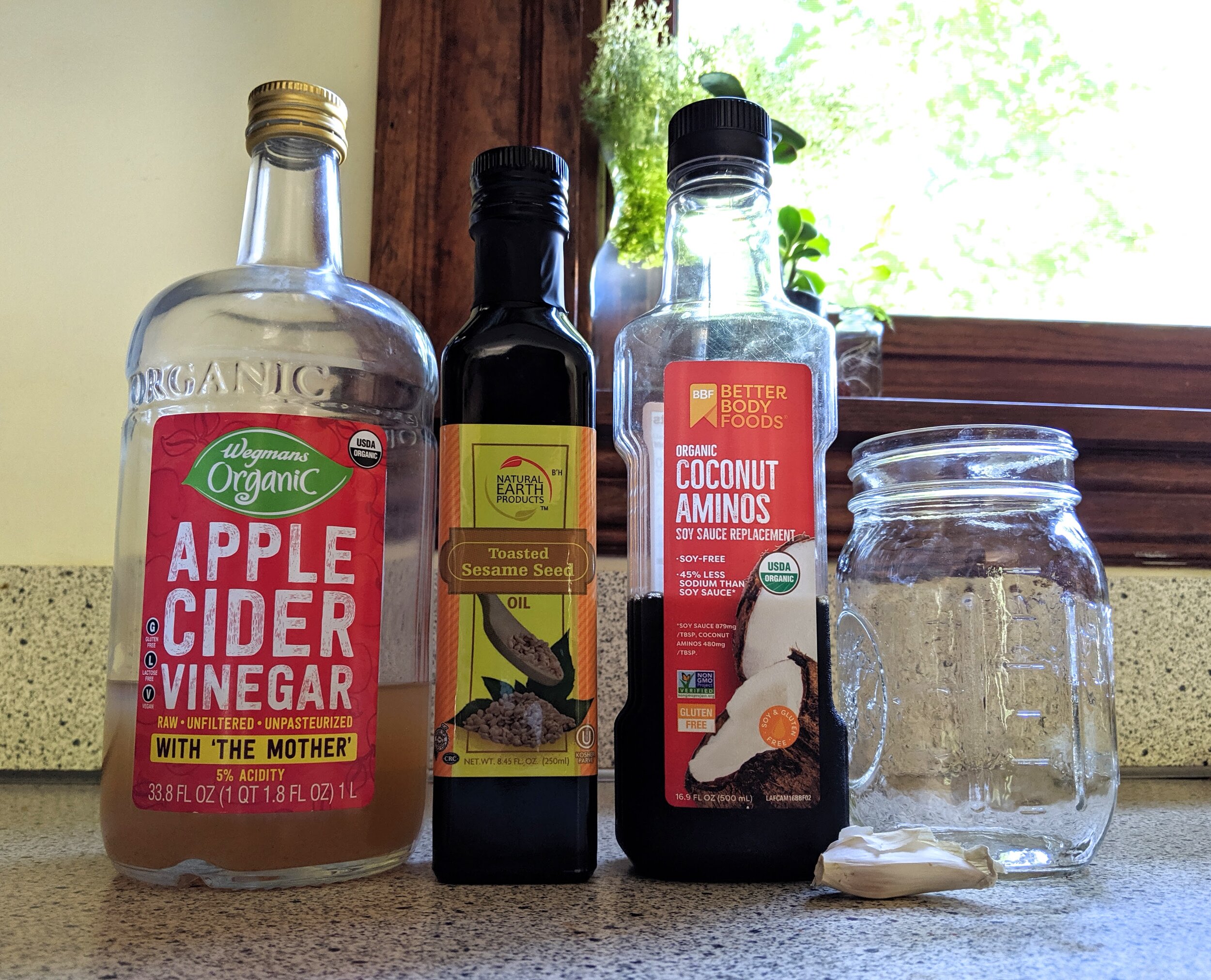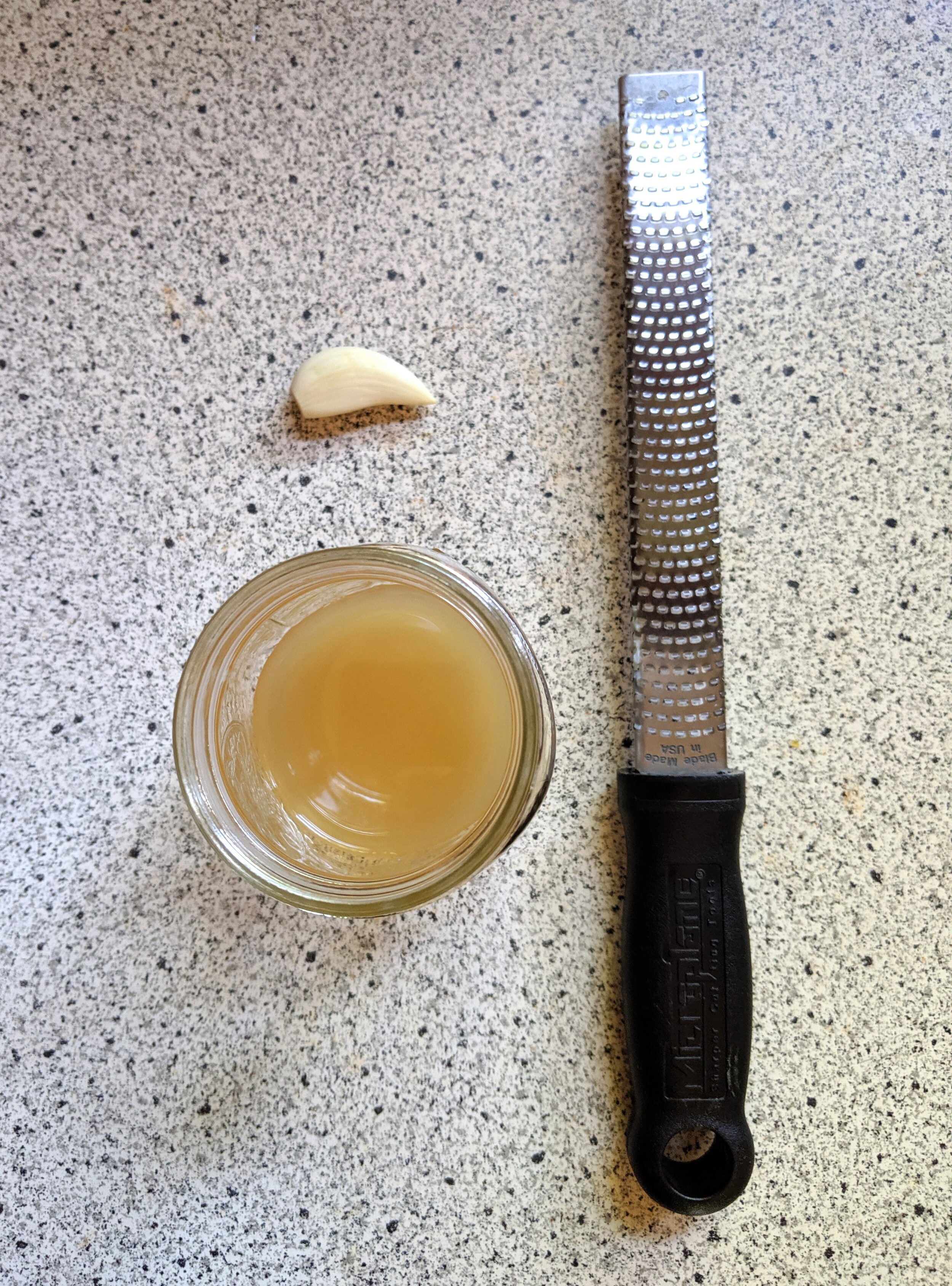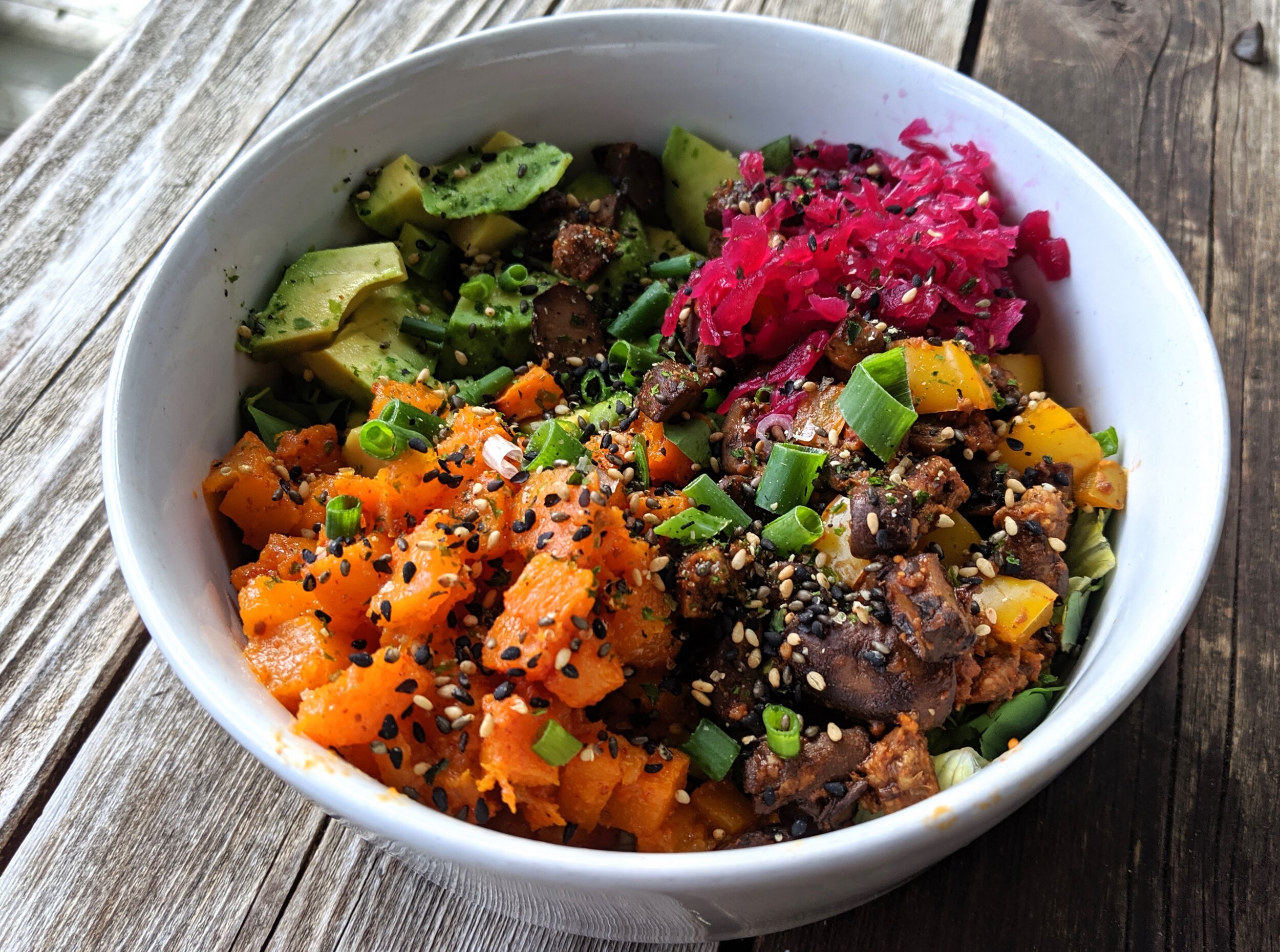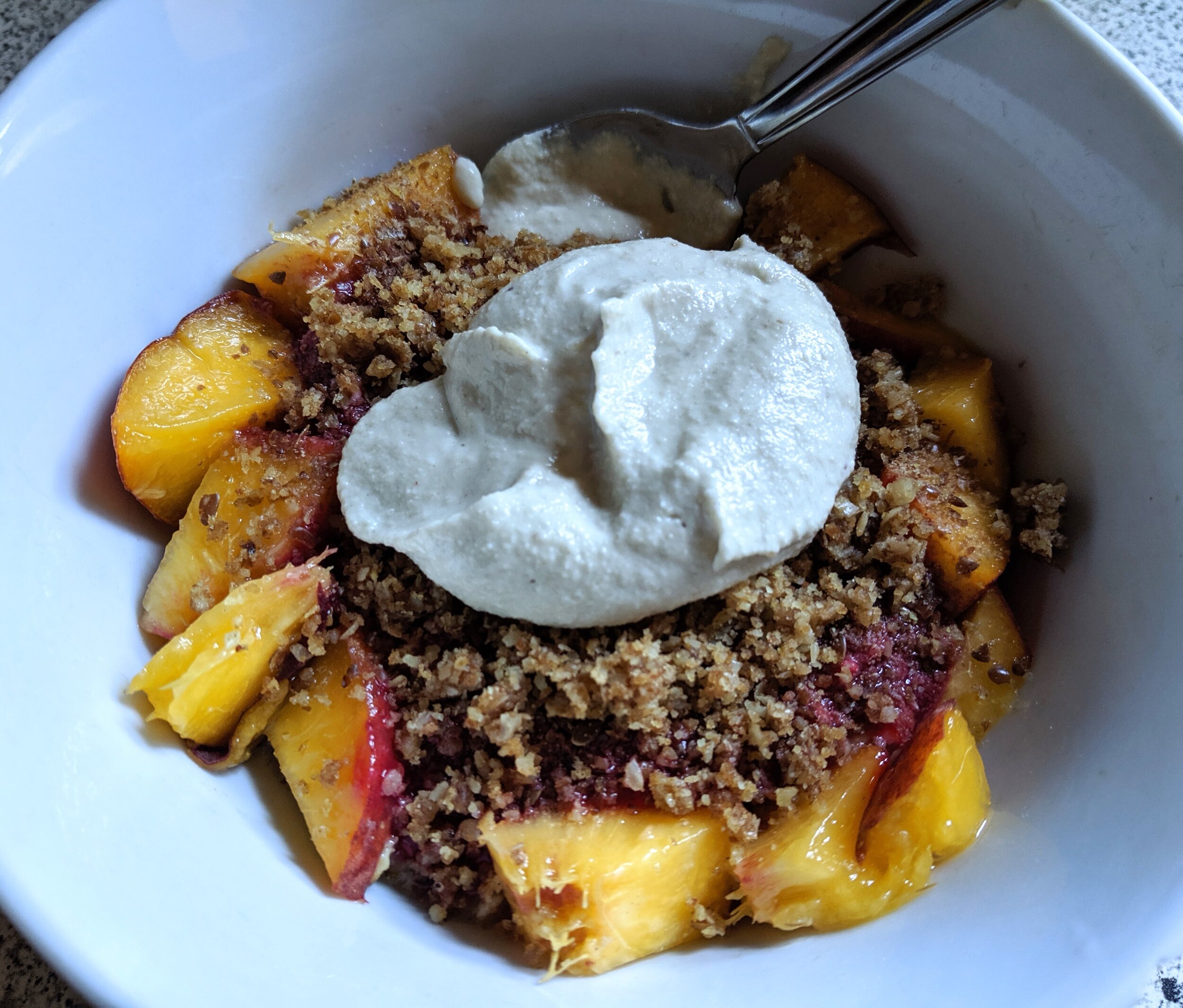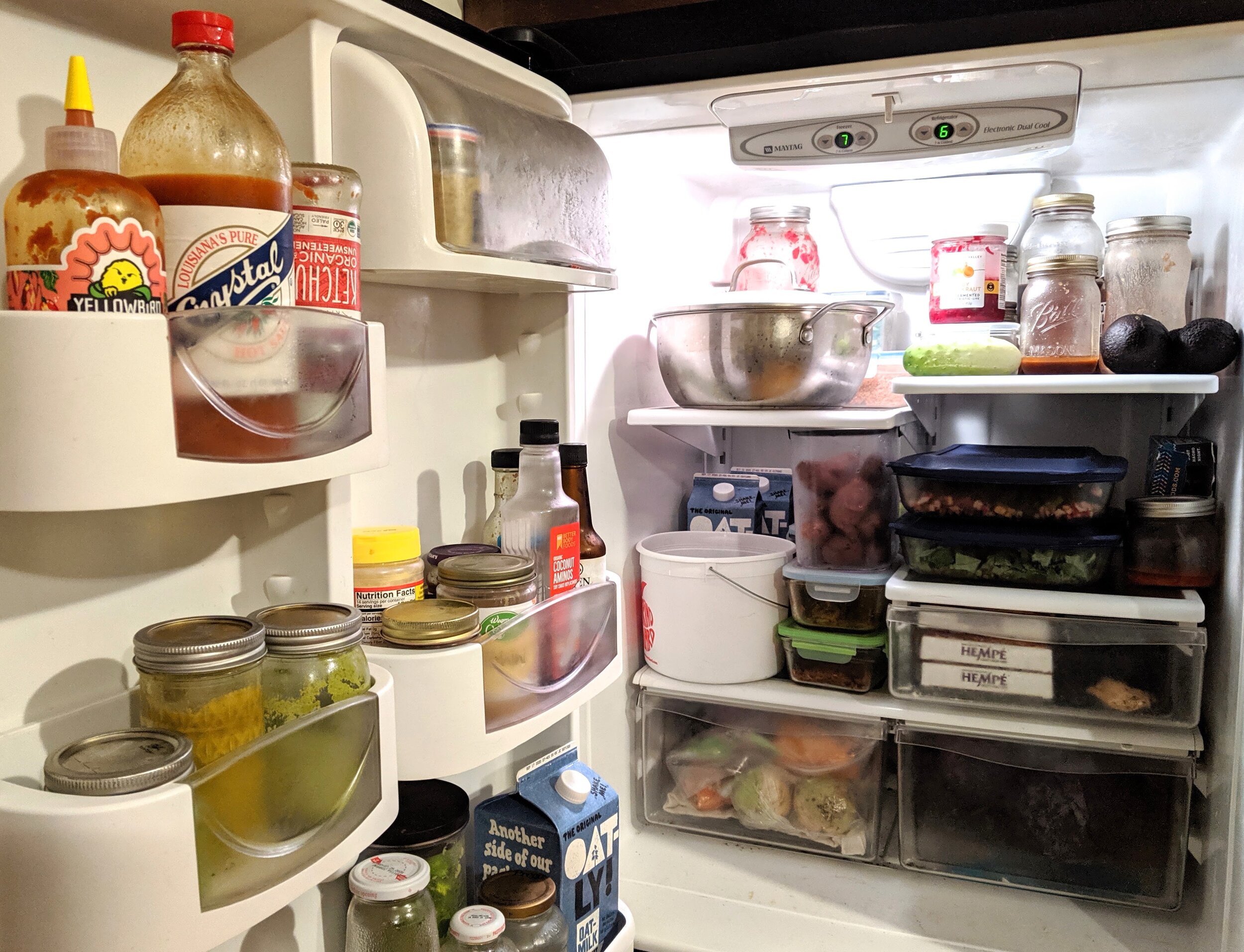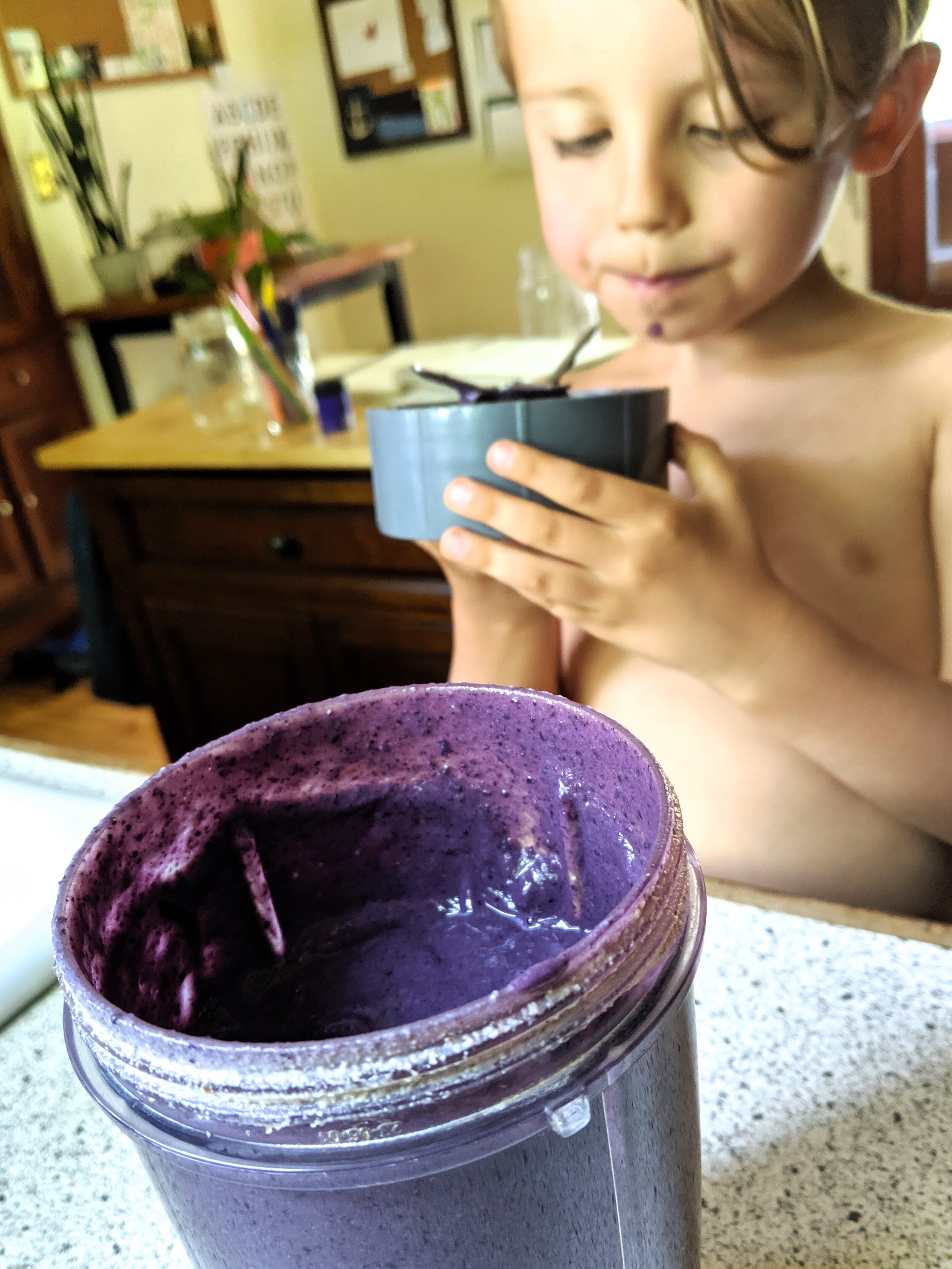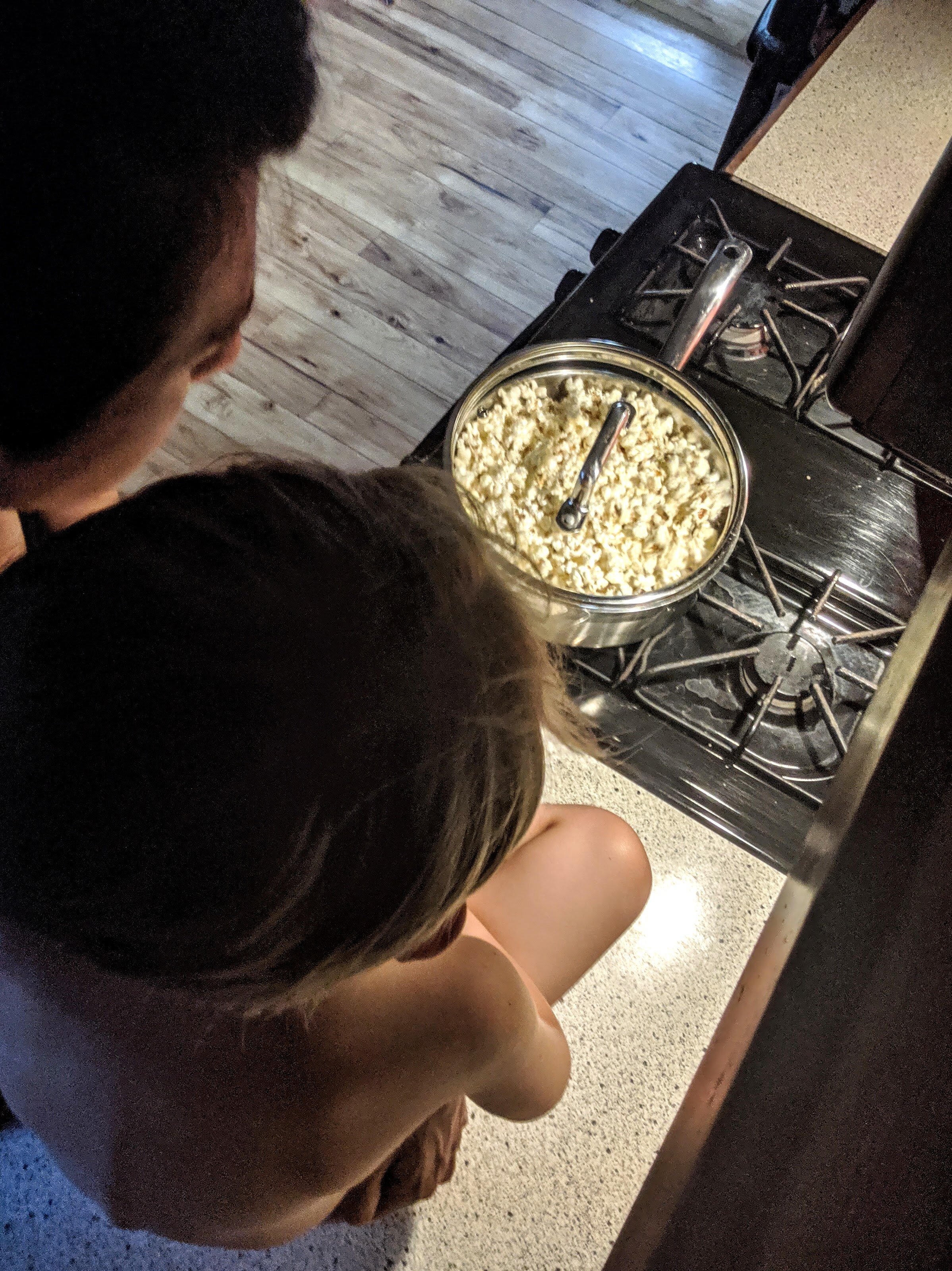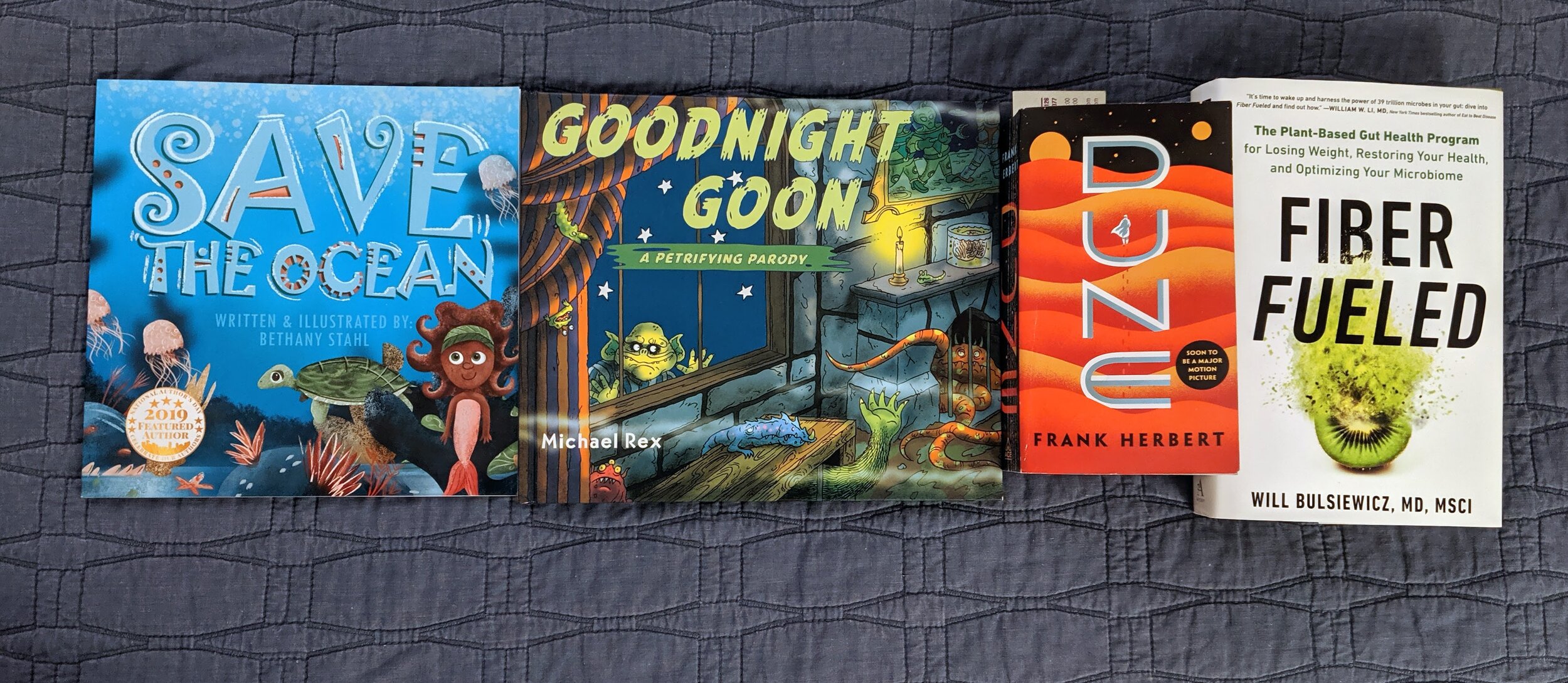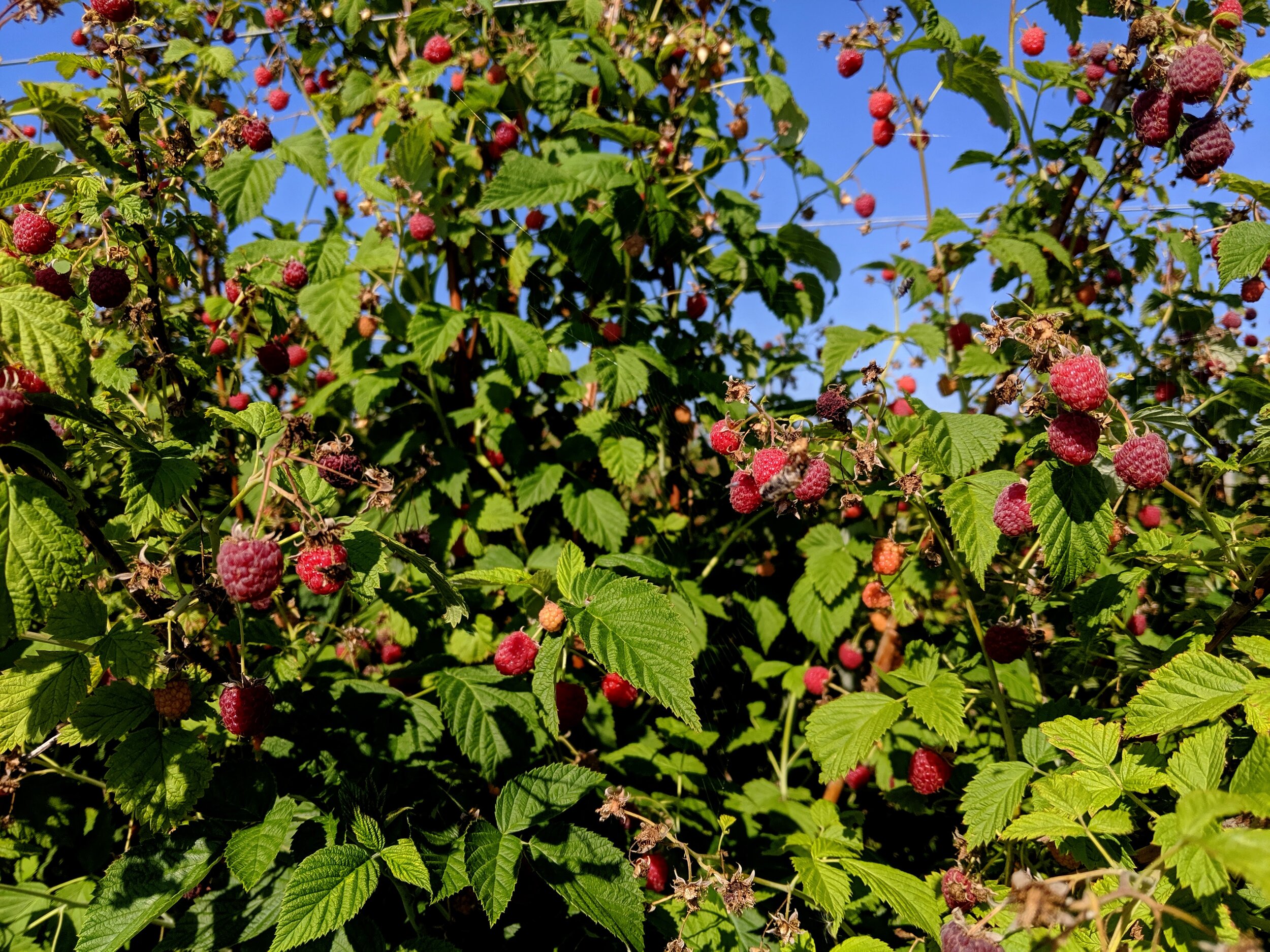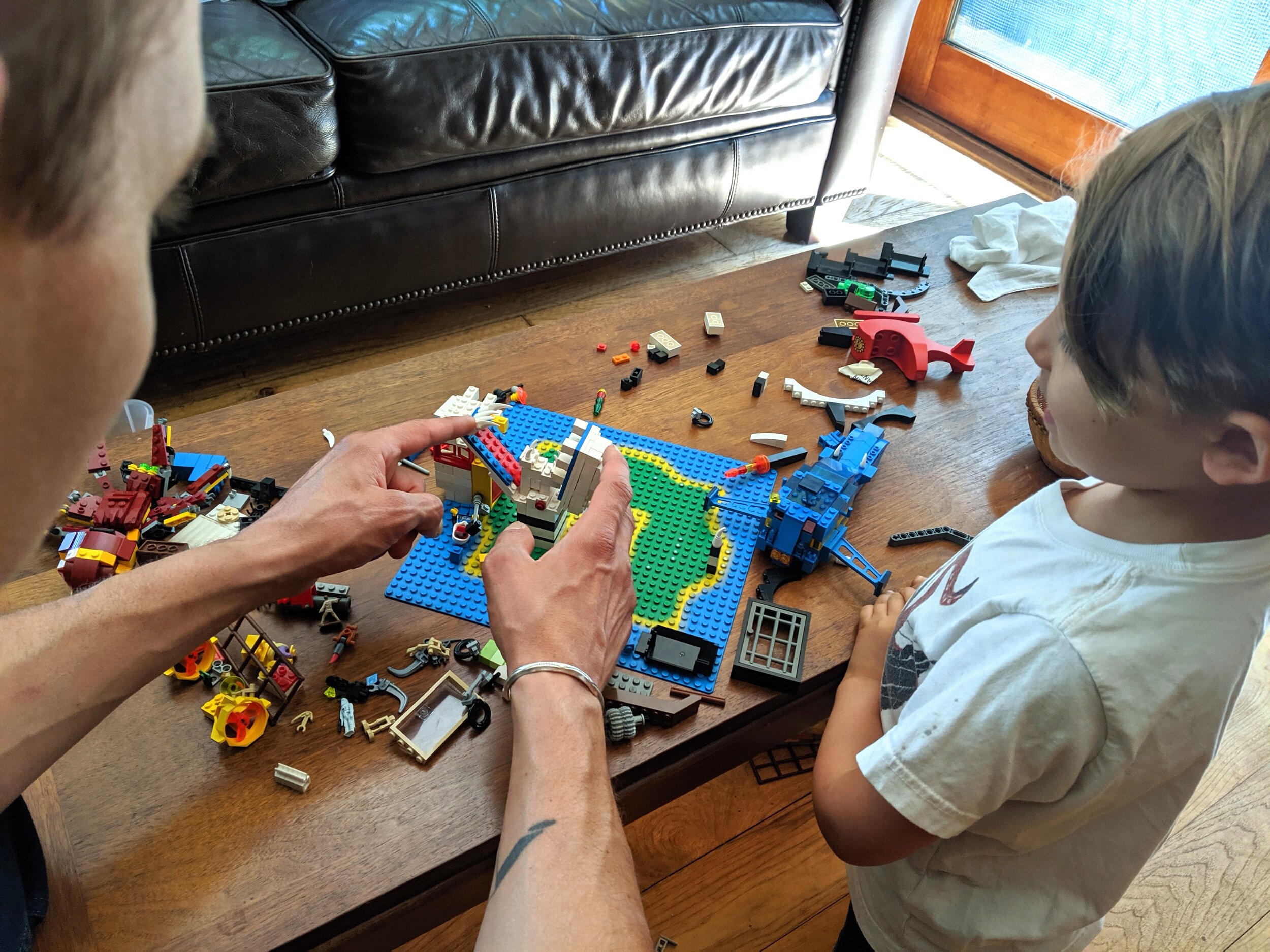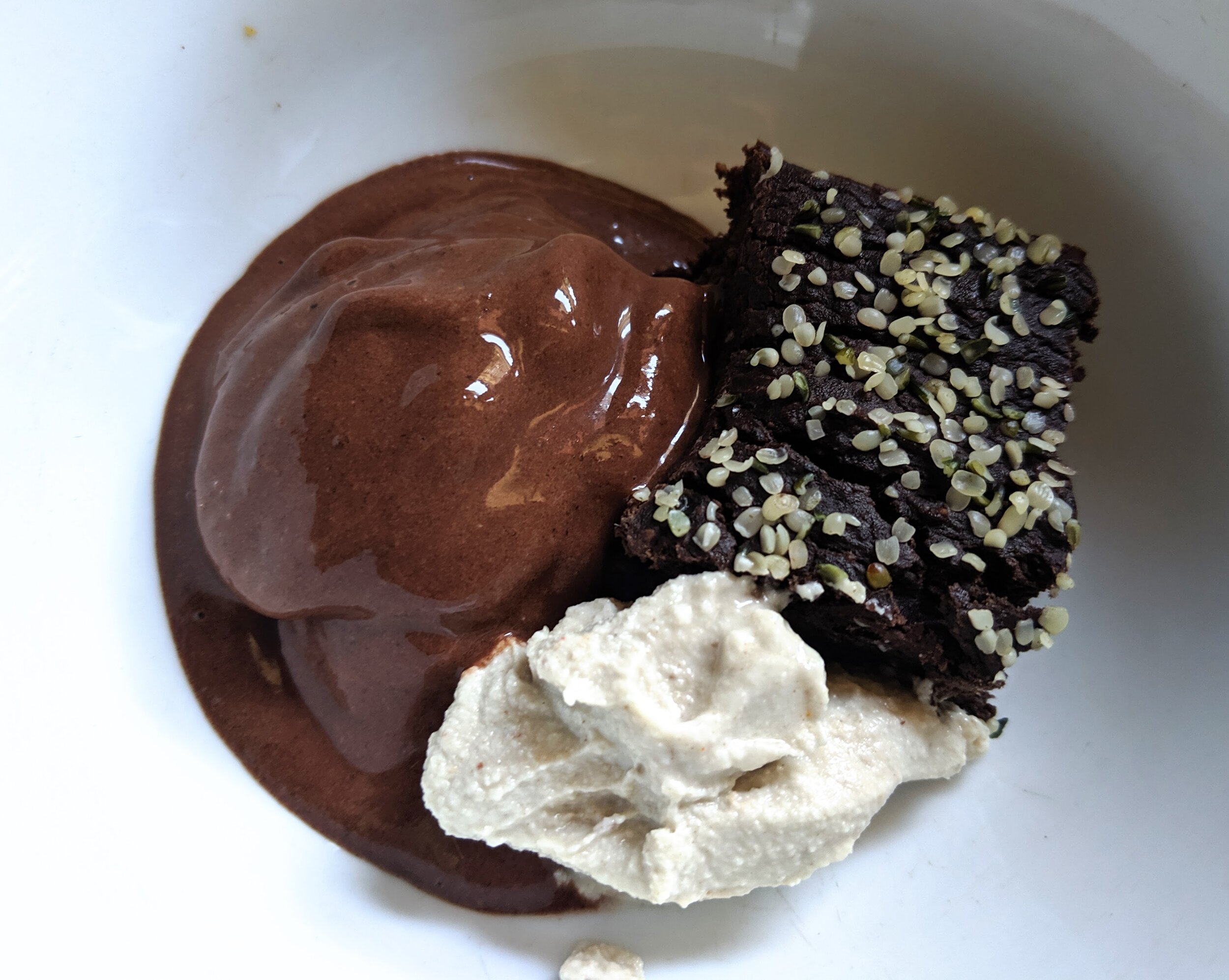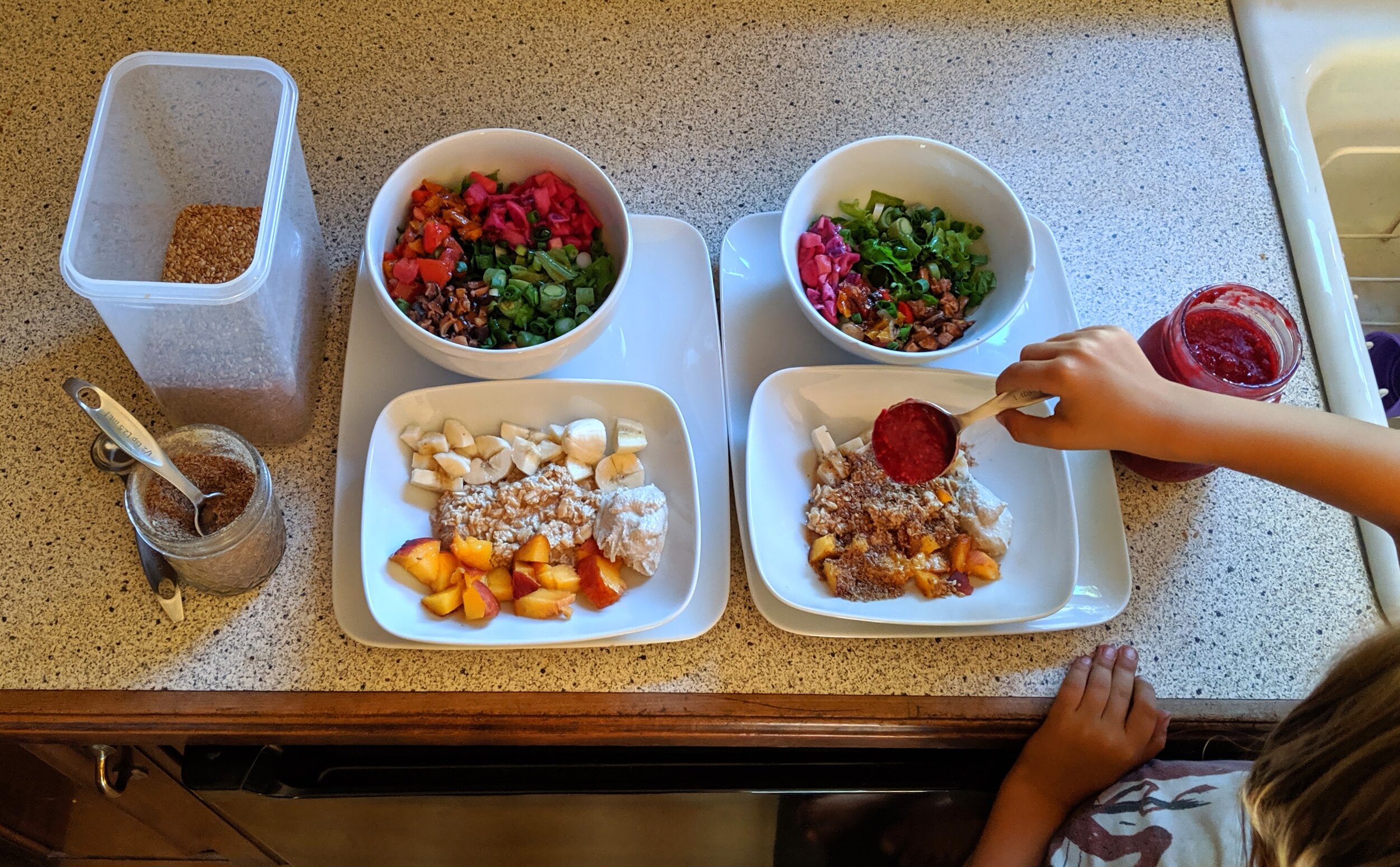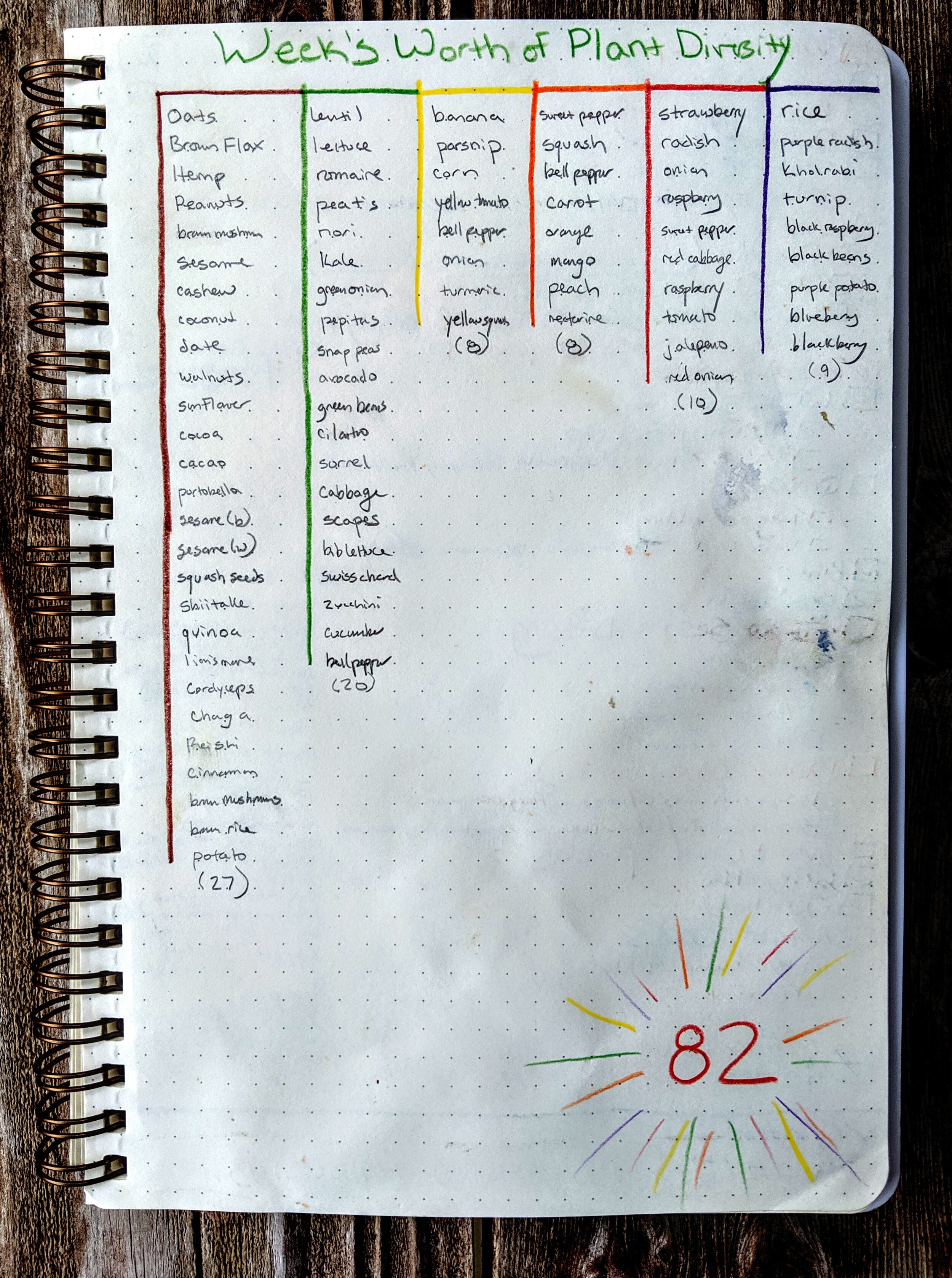Super Simple Sesame Dressing Recipe + Plant-Based Pediatric Nutrition + Why you need to speak up now for the health of your kin before it's too late
If you have soy sauce, soy aminos, or tamari on hand: you can use those instead of aminos, just season per taste. :-)
Continue for: Quill’s favorite Super Simple Sesame Dressing (<—plant-based, but we do this in moderation because it is not a whole-food); studies that point to the nutritional benefits of sesame oil; a podcast interview with yet another Pediatrician explaining why and how you should shift your children away from animal products (just like us, she started out as your Standard American carnivore and then learned better through science); a podcast with a Nutritionist illuminating how to raise healthy children with PBWFs; Dr. Joanne Kong illuminating that The American Cancer Society, The American Heart Association, American College of Cardiology, The Mayo Clinic, Harvard School of Public Health, and the National Institutes of Health are also urging you toward a Plant-Based diet; and 2 full days of what this family is eating (<—the cheapest, kindest, healthiest diet there is.)
All you need to get started: apple cider vinegar, toasted sesame oil, soy sauce alternative or soy sauce (<—we can’t do soy), and a clove of garlic.
I touched upon the round-about confusion of oils and health in this spicy tomato oil recipe, but we’ll make it simple: avoid animal products and consume oils in moderation.
Now here’s some interesting information about sesame oil:
“Sesame oil is one of those vegetable oils that are good for you. Most nutritionists like it for two reasons. First, it's rich in mono- and polyunsaturated acids (PUFAs) -- the good kind of fat that cuts cholesterol. Second, sesame oil is low in saturated fats -- the kind of fat that's bad for you. And there's more. Sesame oil contains two unique chemicals called sesamol and sesamin. They are very powerful antioxidants.
Now there's evidence that sesame oil can lower blood pressure. It comes in a report to the American Heart Association's annual meeting of the Inter-American Society of Hypertension by Devarajan Sankar, DO, PhD, of Annamalai University, Chidambaram, Tamil Nadu, India.
Sankar and colleagues studied 195 men and 133 women with high blood pressure. All were taking nifedipine (brand names include Adalta, Nifedical, and Procardia), a common blood pressure-lowering drug. Despite this treatment, all patients still had moderate high blood pressure. Sankar's team asked the patients to switch to sesame oil as the only cooking oil they used.
Sixty days later, the patients' average blood pressure dropped into the normal range.”
“Sesamol is a phenolic compound found in sesame seeds and sesame oil and is regarded as a major antioxidant component in the oil. While raw sesame seeds contain only a trace amount of sesamol, sesamol is produced from decomposition of sesamolin during the roasting process of sesame seeds (Wanasundara et al.,1998).
Sesamol has many important biological activities and health-promoting benefits such as inducing growth arrest and apoptosis in cancer and cardiovascular cells and enhancing vascular fibrinolytic capacity (Jacklin, et al., 2003)”
If you’re interested in further reading on sesame oil, here you go:
Add the vinegar to the jar first and grate in the garlic. If you don’t like a strong garlic flavor, let it sit in that acid for a bit to mellow out.
Add the oil and aminos (or soy sauce), cover, shake, season to taste, and enjoy. Q loves this dressing so much he’d drink it, but use it in moderation. :-)
Tastes great on any vegetable you can think of.
Here seen: a bed of fresh greens, easy avocado, snap peas, green onions, squash, braised carrots, and a stir-fry (of mushrooms, lentil loaf, and peppers), topped with furikake.
Almost identical to above, but with the added joy of Ruby Kraut.
I am a soul focused on apex and intersection, and when enough data points align I get sparked up with illumination. It’s been mentioned before, that I first stumbled into this plant-based realm via dreams urging me to be a more compassionate soul. Compassion is a frequency personally tuned, so I moved forward alone and kept mum about the diets of loved ones, because it was their own choice to participate in cruelty.
The more I learned about the environmental harms associated with animal agriculture, I thought, “Well, people just don’t think into the future enough to see that what they are doing is hurting the sustainability of this earth, and they may nutritionally need those animal products, so who am I to tell them that they are selfishly eating the future? Maybe they truly do need those animal products to live…”
But then I started using all my free-time to soak up books, podcasts, articles, research studies, clinical trials, etc about proper nutrition, and learned it was a categorical that animal products are filling us with disease (and not just the elderly: it’s starting with our babies and causing our children to be filled with preventable diseases) and that the absolute healthiest diet is a plant-based one.
And that’s when I started speaking out.
The array of sources are endless, the path forward has been mapped out by myriad souls, and there is a cacophony of doctors urging us forward for the betterment of our health and the betterment of every species on this climate-collapsing earth.
If there was a way to preserve biodiversity, lives, and a sustainable future for our kin and fellow species *and thrive*, why not move forward & hark, eh?
Q’s Plant-Based Whole-Food Breakfast: sweet cinnamon oats topped with a crumbly crust from the cashew-cream-cake recipe, cashew cream, peaches, and little raw raspberry sauce.
Plant-Based Whole-Food Lunch: a deep bed of greens covered in easy avocado, roasted squash, braised carrots, quinoa (that had been seared with scapes, peppers, mushrooms), ruby kraut, and tomatoes prepped like the balsamic tomatoes but done so with a pickled jalapeno brine (makes the dressing for the whole dish).
How are our lunches so colorful? I prep up a bunch of food and have it easy to pull out for meals. This is what our fridge currently looks like. To save on space (and to make sure things don’t go bad) I often puree up greens into fun sauces (like those jars on the door and the top shelf.)
Dessert: cashew cream cake (working on recipe) with raw raspberry sauce and peaches.
Made a fresh batch of Cappello Brownies and didn’t have any bananas on hand, so tried subbing in a cup of blueberries and BOY HOWDY was that a good idea.
Plant-Based Whole-Food Family Feasting
Ian had missed lunch and breakfast, which is why his side looks like a trough of food. :-)
We had an array of leftovers from a family barbecue Ian and Q had attended, so our bowls are a vibrant mix-match. I’m not going to list it all out here (you’ll see it all in the log below), but suffice it to say this was a highly varied, fiber-forward meal that was absolutely delicious.
Sunday Night treat for family movie time: homemade, zero-waste, plant-based popcorn. <3
Nightly Reading
Q’s Quick Breakfast: Cappello Brownie (<—sugar free, black bean based, protein dense), cashew cream, peanut butter, and an apple.
We spent the morning picking raspberries for Q’s grandma and were both shocked that it was in the 90s by 10. It’s the first time we haven’t filled both buckets: our polar bear selves could not stomach such heat.
Folks, if you’re local: get ye to Navarino Orchard! They have so many unpicked raspberries that are just rotting away uneaten. You could be filling yourselves with delicious fiber, vitamins, and minerals! <3
Q spent the latter half of the morning continuing to work on his latest creation: a Lego Beetlejuice sandworm.
Here seen: him showing his progress to Ian. He’s made a hinged mouth! <3
Plant-Based Whole-Food Lunch: that same quinoa medley (<—cook a big batch and you can pull from it for days!), fresh greens, tomatoes, squash, ruby kraut, and the last cucumbers from those barbecue leftovers.
Dessert: Cappello Brownie, Chocolate Mint Nice Cream, and Cashew Cream.
Man, but plant-based eating is a drag, right? ;-)
I homeschooled Q through the Spring quarantine and have continued to do so through the summer. He works though some kindergarten workbooks and this Kindergarten prep book from Highlights.
Here seen: he was supposed to draw a self-portrait. “It’s me to scale next to a Tremors* sandworm, a Beetlejuice sandworm, and a shai-hulud: the biggest sandworm of them all!”
*he hasn’t seen Tremors, he’s only seen pictures of grabboids.
This sci-fi enthusiast thinks about bizarro creatures all day every day. <3
”Look, Mama! It’s a mama sandworm, and little kid sandworm —like me— and she has two more babies she’s going to have soon!… and that’s the house from Beetlejuice and they have no idea that there are so many baby sandworms afoot!”
Making the most of every scrap and dicing up the roasted peppers and tomatoes left from that barbecue to add to some dinner salads.
What it looks like while I’m in the kitchen: prepping food, listening to podcasts, and making notes for illuminating folks who don’t have the time to do any of the above.
Yesterday I did my second listen of this great interview with Plant-Based Pediatrician Dr. Yami Cazorla-Lancaster.
Hoping to absorb the wisdom from voices of color and also learn how to raise healthy children? Boy Howdy, set yourself aside an hour and dive into this beautifully inspiring and illuminating interview.
If you’re thinking to yourself, “My pediatrician is telling me to give my kids milk several times a day and has never mentioned the harms of animal products, so what the hell do you know?!” She was one of those pediatricians, just like Quill’s pediatrician was one of those pediatricians.
But hey, life is SUPPOSED to be about absorbing new information and growing forward, RIGHT?
Dr Yami stumbled into plant-based nutrition when she read Born to Run, and had the wherewithal to go research how it was that these ultra-marathon runners were able to do more than she could in her own running, and do so completely plant-based. Her mind was keen and open enough to go dive into the research, and not only did it better her whole health, it has radiated out to her whole pediatric practice, and now she’s bettering the lives of every family she serves.
What they discuss in this episode:
Instilling healthy habits early in life
How to meet families where they are and transition to plant-based slowly (she was raised in a Panamanian food culture and her relatives own a dairy farm, so this was a big change for her too)
Osteopathic medicine and the body’s ability to heal itself
Prenatal nutrition
Milk, meat, and child nutrition
How to foster a healthy relationship with food in your children
How to get children to eat a plant-based diet
Dr. Yami’s website, Veggie Fit Kids, and her practice, Nourish Wellness
All the constipation, abdominal issues, and acne children have and how it directly correlates to consuming dairy. Also, how dairy causes early menstruation and breasts to form on our sons [Not mentioned, but as Dr Milton Mills has pointed out: doctors advising all children to drink dairy is institutionalized racism.]
How it is completely false that cow breastmilk gives you strong bones (Vitamin D is actually added to cow breastmilk, and the countries that drink the most of it have the HIGHEST NUMBERS OF OSTEOPOROSIS! I touched upon why in this post too. )
How plant-based diets are about LONGEVITY (Gastroenterologist Dr Will Bulsiewicz preaches the same thing here) and how she is passionate about making sure her patients lead long, healthy lives
If that podcast lights you up and you want some further listening, this “Understanding Your Gut And Raising Healthy Children With Dahlia Marin” interview is another favorite.
What they discuss in this episode:
How her unhealthy early lifestyle led to her pursuing a degree in nutrition (she was pre-diabetic, had thyroid issues, and diagnosed as obese. She turned it all around with a plant-based diet!)
Comprehensive explanation of what goes on in your gut (and how it may lead to disease)
The downside to antibiotics
How food can help or hinder your gut
How to retrain your gut to digest fibrous foods
How to raise an infant, dairy-free
James Marin’s Switch4Good interview (<—another favorite!)
Dr. Angie Sadeghi Switch4Good interview (<—my absolute favorite!)
If time is short and quick videos are your thing, check out this TED talk by Dr. Joanne Kong:
“I want to make clear that my intent is not to be judgmental, but instead to increase your awareness and give you important information which you may not know. Going greener with your diet, could be one of the most powerful and transformative decisions you ever make in your life, for three significant reasons: it has tremendous benefits to your health, it’s critical to the sustainability of our planet, and it will widen your circle of compassion.
Overall vegetarians have a longer life expectancy and substantially lower rates of heart disease, high blood pressure, type 2 diabetes, cancer, obesity, osteoporosis, Alzheimer’s, Parkinson’s and the list goes on. But don't just take my word for it. Support for vegetarian diets comes from numerous organizations, including: The American Cancer Society, American College of Cardiology, The Mayo Clinic, Harvard School of Public Health, and the National Institute of Health which says: ‘Vegetarians may be missing out on grilled hamburgers at picnics, but they also tend to miss out on the major health problems which plague most Americans.’”
Over here we ditched the harmful animal products and moved forward. I loved Q too much to knowingly fill him with disease, and he loves every single food we set before him.
Here seen: Q helping me prepare some “breakfast for dinner” with side salads dressed in his favorite sesame dressing.
Cappello Breakfast For Dinner
Salad: bed of kale/swiss shard/romaine, snap peas, green onions, quick-pickled medley (radish and red cabbage this time), squash, shiitake mushrooms, and that mix of peppers/tomatoes/onions, dressed in the sesame dressing.
Sweet Cinnamon Overnight Oats: with peaches, banana, raw raspberry sauce, cashew cream, flax meal, golden flax seeds, and crushed pecans.
Last night Grandma and Grandpa came over to share some of their fireworks.
Q’s plant-based buddy munching on some romaine we grew from seed. (Need to clean Rad’s terrarium today. He keeps it clean, but the frog kicks up dirt everywhere.)
Rad checking us out. <3
Nightly Reading
Just realized garlic wasn’t on this list (or the last one) because it is so omnipresent I fail to think of it singularly. So make it 83. :-)
How’s your weekly plant variance going? The best nutritionally-focused docs recommend that you get at least 30 different plants into you within the week. Why? Your microbiome is bettered by diversity. Our input is so robust because we participate in a local CSA (<—saving a LOT of money over traditional shopping) and we eat plant-based for optimal health.
Is your diet a rotation of meat and grains? That’s what mine used to be.
You only make what you measure, and America is sadly known to be severely deficient in fiber. Gut health = whole health so it is worth focusing on.
What’s the most impactful thing you can do as an individual to help your kin, community, millions of species, and planet? Transition as plant-based as possible.🌎♥️
Why? Plant-Based foods are environmentally imperative 🌎. They also promote ideal health💪 (which takes stress off our overburdened health care system), are inexpensive🙌, delicious🤤, & compassionate. 💕
Why imperative, though? 🤔We’re approaching (& have crossed) climate tipping points that will doom our kin & millions of other species. 😱📣Reducing/eliminating animal products is the *most impactful thing an individual can do* to prevent worse. 🌎🔥
Why? Animal Agriculture creates more emissions than the entire transportation sector combined, it’s tied to water waste/loss/pollution (<-- freshwater is our most precious resource💧), land loss/deforestation (<-- exacerbates climate change by reducing our ability to sequester carbon🔥🌎), ocean acidification (<-- FYI 50-85% of earth’s oxygen originates from oceanic plankton🌊) & vast species loss/extinction/suffering💔📣🌎
Plus, consuming animal products is tied to increased risk of cardiovascular disease❤️🩹, diabetes👎, cancer👎, and chronic disease👎; whereas Plant-Based feasting is linked to preventing/reversing some of our most common diseases (<— like cardiovascular disease, diabetes, and cancer); plus it promotes ideal health & robust strength (ie Olympians, Weightlifters, Endurance Athletes are thriving via PBWFs too). 🎉🙌♥️
What organizations are promoting plant-based diets for best health and environmental stability? National Institutes of Health, Mayo Clinic, Yale, the United Nations, Harvard School of Health, American Heart Association, American College of Cardiology, American Cancer Society, American Diabetes Association, The American Academy of Pediatrics, National Kidney Foundation, even the Parkinson’s Foundation.
We’re all overwhelmed in one way or another, but for the sake of our kin (and the millions of species we share this planet with) we need to start pivoting forward. As someone who once rarely ate green things & used to eat animal products at every meal, I can assure you that is possible, affordable, enjoyable, & purposeful to pivot Plant-Based. In fact, our whole family is now healthier/stronger than ever. 🙌♥️
Anecdotally, our son had failure-to-thrive, was also plagued with perpetual ear-infections/sinus-infections, and had an omnipresent runny nose. What was he eating? Grass-fed milk, organic/antibiotic-free/grass-fed/local meats, eggs from organic-fed/well-loved chickens from a neighbor, every meal came with vegetables, and we limited junkfood. He was healed via a plant-based diet: he’s launched out of that diagnosis and the last time he had a sinus-infection (or was sick at all) was in 2019 when he had some cheese at a school Christmas party. Before shifting to PBWF’s he was sick every month, and how he’s a robust, vital, thriving kiddo. 🙌🎉♥️
If you think any of the above sounds over-reached/absurd/impossible, please go read the links above. I understand the inclination to hackle-raise (<—because I was once totally there) but the science is clear: any step we make forward is imperative (<—and again “STEPS” is the focus. Don’t leap, just start making steps!). It’s as simple as starting with one meal a week and growing from there.💕
We have the ability (deliciously, healthfully, kindly, inexpensively) to *preserve/protect* the planet we share with millions of species & our kin. How are we going to use that power today?✌️🤟🖖


